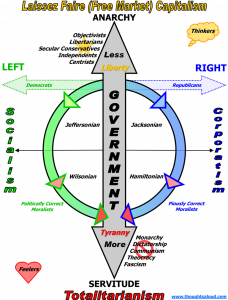 Libertarian Pragmatist
Libertarian Pragmatist
In the slowest chat on the internet, I have been having intermittently with my dear friend Tom, the retired English Professor (dear, because I shall always be eternally grateful for the time he told me he did not find my essays verbose 🙂 ), I recently explained how I came to regard selfishness as a virtue:
I received my grounding in this unconventional wisdom from a few books I read as a young man. As I recall, the first were “Winning Through Intimidation†and “Looking Out For Number One,†both by Robert Ringer. His bibliography led me to “The Art of Selfishness,†by David Seabury and “The Virtue of Selfishness†by Nathaniel Branden. Then, I got around to reading “Atlas Shrugged†and “The Fountainhead,†and eventually every book Ayn Rand wrote. I have been an Objectivist ever since; although I usually refer to myself as a libertarian, since so few people have ever heard of objectivism.
It occurred to me that I had not heard of Robert Ringer for years, and I wondered what happened to him. I was delighted when Google found him for me, and I have been perusing his active website. Under the heading of “Core Beliefs,” I found an excellent essay entitled, “Survival of Western Civilization,” which is well worth the read – especially for libertarian purists who denounce the slightest whiff of pragmatism in their ranks. For instance:
Reality is synonymous with truth, and truth is unyielding. One can choose to ignore it, scorn it, or even curse it, but all to no avail; in the end, truth impassively stands its ground in the face of the most overpowering emotional, verbal, and intellectual onslaughts.
Further, truth can be especially brutal to those who insist on worshipping at the Altar of Theory. This is because truth has a way of frustrating theory and, much like a mongoose circling a snake, ultimately wearing it down and devouring it.
…and:
Sadly, libertarians have a reputation for fighting their battles in an intellectual arena, which has proven to be ineffectual in the real world. By real world, I am referring to a world where enemies of freedom and Western culture have no qualms about lying, cheating, deceiving, and even using force, if necessary, to achieve their ends.
A worse problem, however, is that theoretical libertarians do not even oppose most of these threats. After all, the keystone of theoretical libertarianism is that everyone should be allowed to live his life as he so chooses so long as he does not forcibly interfere in the lives of others. One is left to conclude that if such tolerance results in the extinction of our culture, so be it.
…and:
Where I believe theoretical libertarianism fails the real-world test is in coming to grips with the dangers posed by uncivilized people in every country of the world, and, in particular, uncivilized people who are in positions of absolute power. Because libertarians believe that there is only one true law-the natural law against aggression-a purist libertarian would wait until a crazed fanatic detonated a nuclear weapon in midtown Manhattan before taking action.
Worse, the same libertarian would ignore the enemies from within and sit idly by as Western culture disintegrated before his very eyes. The implied motto is: No harm, no foul. And since no one has the moral right, let alone the power, to define either harm or foul, Mohammed Atta’s observation about our stupidity looks ever more accurate.
…and:
Theoretical libertarianism relies on the voluntary goodwill of everyone. As a result, purist libertarianism is impractical in a world gone mad. Clearly, it needs a strong partner to help it enforce freedom.
Enter practical conservatism. My definition of practical conservatism is an ideology that believes in adherence to the tenets of pure libertarianism to the fullest practical extent, but also believes in the use of force, when and where it is absolutely necessary, to protect not only the lives and property of citizens, but to maintain society’s generally accepted code of conduct.
Exactly! Read the whole thing. I feel like I have come full circle. Reading Ringer’s books over 30 years ago led me to Rand, yet my attempts to identify with most libertarians has been less than satisfactory; because of their purist wrangling over theory and some outright settling for anything less than anarchism. Ringer gets it. I look forward to participating on his blog. â—„Daveâ–º
